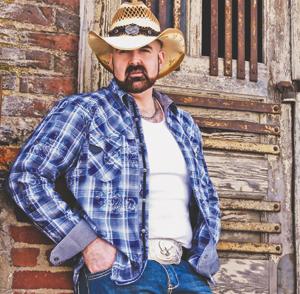“I’m going to tell the truth,” says country singer Drake Jensen. “Whether people agree with it or not is their own business.”
At the tender age of 42, the Ottawa-based, Cape Breton–born performer has recently released his first album, On My Way to Finding You. Tragedy turned this career milestone into a deeper new mission.
In the video for the album’s title track, Jensen greets his real-life partner, 46-year-old Sean Morin, with a hug in the front yard of a country home while a dog waits on the porch. It’s a bucolic vision of bear heaven but one Jensen knew would be controversial in a conservative genre.
“Country music has always been about honesty,” he says. “When Loretta Lynn sang about ‘The Pill’ in 1975, she stirred up the shit in the chicken coop,” he laughs. Coming out as gay is no different, he says, even as his voice cracks a little when he insists, “If I publicly deny the love that my husband and I share, then I will never stand for anything. I will be nothing.”
Two weeks after the video was shot last October, 15-year-old Ottawa student Jamie Hubley committed suicide, his personal social-media posts detailing how isolated and bullied he’d been. Jensen was devastated. “It was like someone took a shovel and hit me straight between the eyes with it,” he says. “I was a recluse for a week.” Finally, he sat down and wrote a letter to Hubley’s father, telling the Ottawa councillor of his own childhood.
“It was the first time I’d ever written down the abuse I suffered as a child, at home and at school,” Jensen says. “I was a fat kid and kind of feminine. I got called ‘fag’ at school and ‘queer’ at home. At 15, I left school and locked myself in my bedroom for six months . . . I just shut down and went on auto-pilot.”
Hubley’s death brought these memories crashing back, and Jensen asked himself, “You survived. Is that fair? Well, you have something to do . . . tell people.”
Allan Hubley sent Jensen a photo of his son, and the singer then wrote a dedication for the video. “My biggest fear is that I’ll be viewed as opportunistic,” he says, “but on this, I had to follow my heart.”
He plans to follow up by releasing his next single, “Scars,” only on iTunes, with proceeds going to bullying.org. “I look at that site and think, ‘Where were you 30 years ago?’” he says, eyes watering as he quotes a lyric from “Scars,” written by Toronto songwriter Don Graham: “All the shame and anger he keeps under lock and key.”
“It took me a long time to get here,” Jensen says. “Everyone asks me, ‘Why did you wait until you were 42 years old to record your first album?’ but I couldn’t have done this five years ago. I was too emotionally damaged.”
Jensen’s cover of an Anne Murray song got some airplay on CBC Radio back in 2001, but his singing career was quickly aborted. “I wasn’t ready,” he says. “I was shutting down because of the abuse.” By 2008, he says, “I was living in Moncton, coming out of a very bad relationship, and I was 325 pounds. I ate my emotions.”
Meeting Sean Morin online one night changed everything. “I knew there was something special about him,” Jensen says. “We talked for four to five hours a night, and that was the beginning of my healing journey.” The singer credits his husband — a civil servant in Ottawa and now also his manager — with helping him “unpack the baggage” and guiding his revived career.
Dressed in blue jeans, with a matching black vest and cowboy hat, Jensen wears a crisp black-and-blue-striped tie and has a bear paw tattooed on his neck. “I decided to tag myself when I moved to Ottawa because I knew who I was,” he says. “I’m in the best shape I’ve ever been, and I’m so proud to represent that a big, bald, non-GQ-type guy can stand up and do this. I’m proof that no matter where you are in your life, what counts is what you do right now. You can make a change.”
While the world of country music has been grudgingly accepting of out lesbians kd lang and Chely Wright, gay male performers, such as Doug Stevens, were never supported. Any meagre progress has come from straight-but-not-narrow stars like Willie Nelson and Garth Brooks, whose single line, “When we’re free to love anyone we choose, we shall be free,” caused controversy in 1992. Last year, gay songwriter Shane Stevens, who wrote a hit for Lady Antebellum, bluntly declared, “They’re not going to play a gay artist on the radio.”
“I believe that you get what you believe,” Jensen says. “It’s a cliché, like that book The Secret, but I started to live my life like that. Once the universe knew that I was ready, it lifted the blanket and allowed me to rise. All these wonderful people came into my life.”
Canadian country radio has been more open, says Jensen’s “pitbull” publicist Deborah Wood: “No one will say to me that they won’t play the single because he’s gay; they say things like, ‘He doesn’t fit our demo,’ but I know when they’re bullshitting,” she laughs.
Jensen isn’t worried about being rejected for coming out. “If this video is the last thing I ever do as a country artist, it will be worth it.”
With his rich, clear voice that carries a hint of Randy Travis, Jensen credits Garth Brooks, Loretta Lynn and Michelle Wright as influences, but he also loves Duran Duran and, most surprisingly, longs to do a country duet with RuPaul, “an incredible inspiration to me.” Most of all, however, there’s the one-and-only “Backwoods Barbie,” Dolly Parton. “I learned from Dolly that you have to be yourself, no matter what anybody thinks,” gushes this burly, bearded man.
Being Canada’s first out gay country-music singer is, Jensen says, “interesting and intimidating at the same time, but there is nothing on earth that is going to stop me from singing, from reaching people with what I’ve got in here,” he says, tapping his chest. “No matter what I go through from here on in, it will all have been worth it. I’ve opened the door a crack, and I believe the light will shine through.”


 Why you can trust Xtra
Why you can trust Xtra


